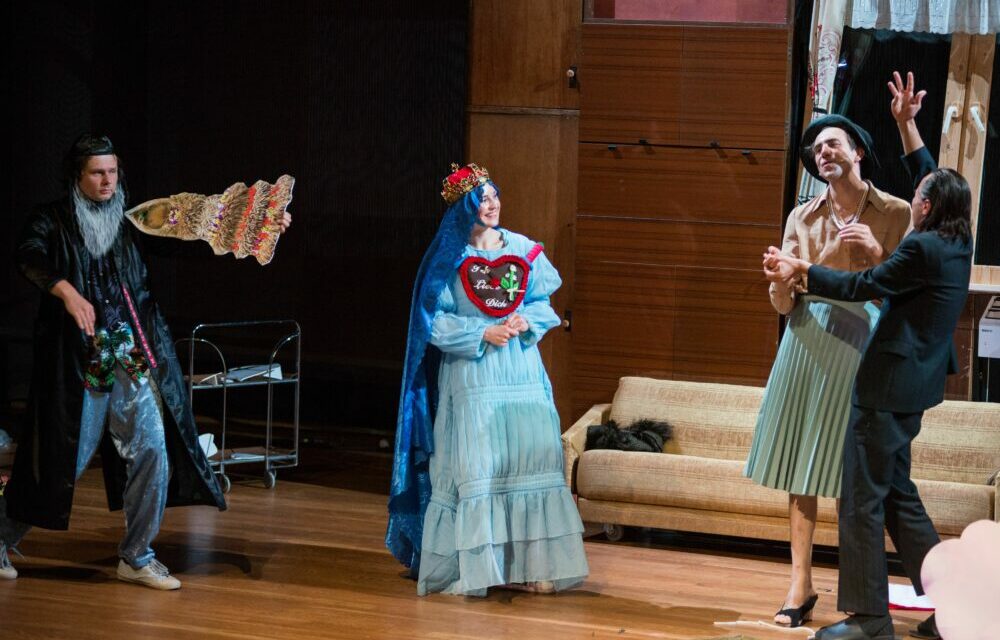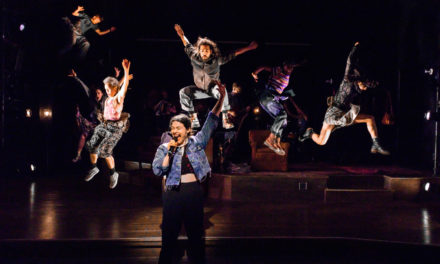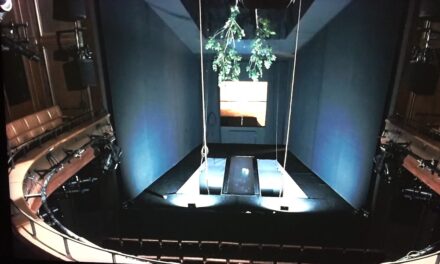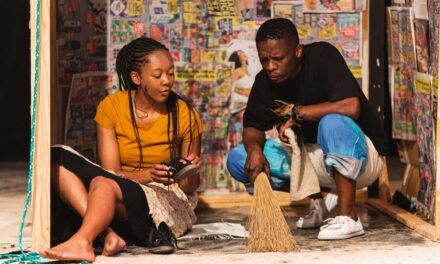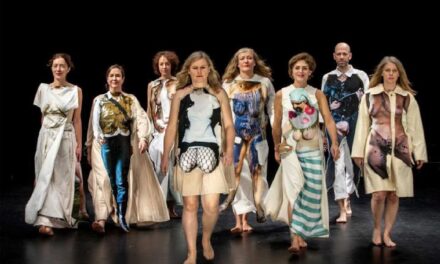The Polish narrative of 1968 tends to end with the conclusion that Jews lived in Poland after World War II but ‘left’, ‘disappeared’. Yet the silent, forgotten and denied void that opened in the aftermath of 1968 is an important part of Polish identity and was discussed for a short time 50 years after the events. To mark that anniversary, TR Warszawa and the POLIN Museum of the History of Polish Jews announced an open competition for a theatre production exploring these events. The winners were Jędrzej Piaskowski and Hubert Sulima with a piece tentatively titled Juden (R)aus Arras. The fact that the play had a set theme might have aroused suspicion, as it seemed reasonable to think that it had not been created out of a genuine need and desire. Once again, however, as in Puppenhaus: A Therapy, Piaskowski and Sulima have demonstrated that they are not only interested in Holocaust memory and Polish‒Jewish relations, but also imbue their plays with an extraordinary perspicuity, intelligence and humour. And, most importantly, they are very much aware of their entanglement in a number of discourses and seek to distance themselves from them.
For starters, it should be noted that David is staged both at TR Warszawa and at POLIN. The latter venue highlights an important aspect of Piaskowski’s piece. A huge museum where one can learn about the realities of Jewish life in Poland hosts a play that makes a slight mockery of the Polish interest in the Jewish past, which sometimes borders on obsessive. The creators show the standoff the Polish narrative on Polish‒Jewish relations has descended into, stretched between empathy, nostalgia and aversion to an almost absent minority, which effectively makes it impossible to reflect on the current situation.
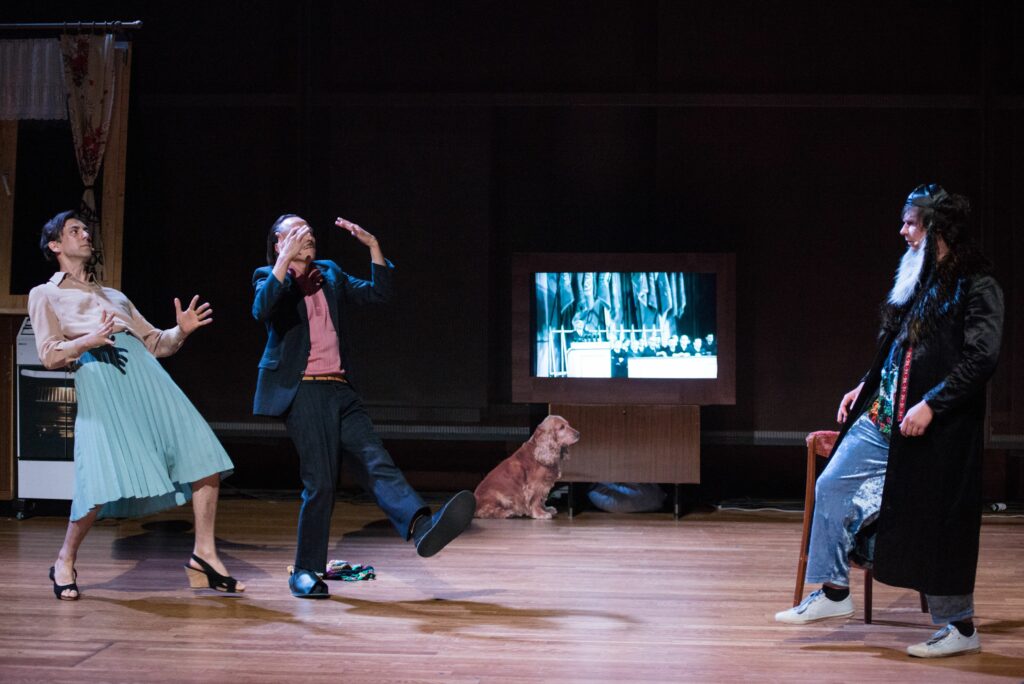
Sebastian Pawlak, Jan Dravnel, and Rafał Maćkowiak in Dawid jedzie do Izraela by Jędrzej Piaskowski and Hubert Sulima; directed by Jędrzej Piaskowski. Photo by Muzeum POLIN / Maciek Jaźwiecki.
Neither the creators nor the actors were personally involved in the March 1968 events. They glean their knowledge from the archives and a handful of contemporaneous testimonies. Gathering knowledge about the past and performing it in theatre is an important theme of the piece. In the first scene, Sebastian Pawlak, Jan Dravnel and Rafał Maćkowiak enact a visit to the exhibition ‘Estranged: March ’68 and its Aftermath’, which was staged last year at POLIN. The set includes a wall unit and sofa as well as a coat hanger on the left and a wooden table (looking more like a school desk) with chairs on the right. An upstage screen shows a looped video of Gomułka’s infamous speech on Zionists and the fifth column. The actors move around the stage (Maćkowiak slides across the floor in museum slippers), study elements of the set, watch archival footage (‘What is that?’ ‘What do you mean you don’t know? Dejmek’s Forefathers’ Eve.’ ‘Gosh, it’s so dated.’ ‘Oh, Dzierżoniów is where I come from.’). They come up to the ‘exhibit’ and, with undisguised, even exaggerated emotion, spin fantasies bordering on kitsch (‘They probably talked here before leaving. The last thoughts. The last tears, the last half teacup. I wonder what happened to them later’, says Pawlak, looking at the table.) The actors discover a room not marked on the exhibit plan and this is where the story of David’s family begins.
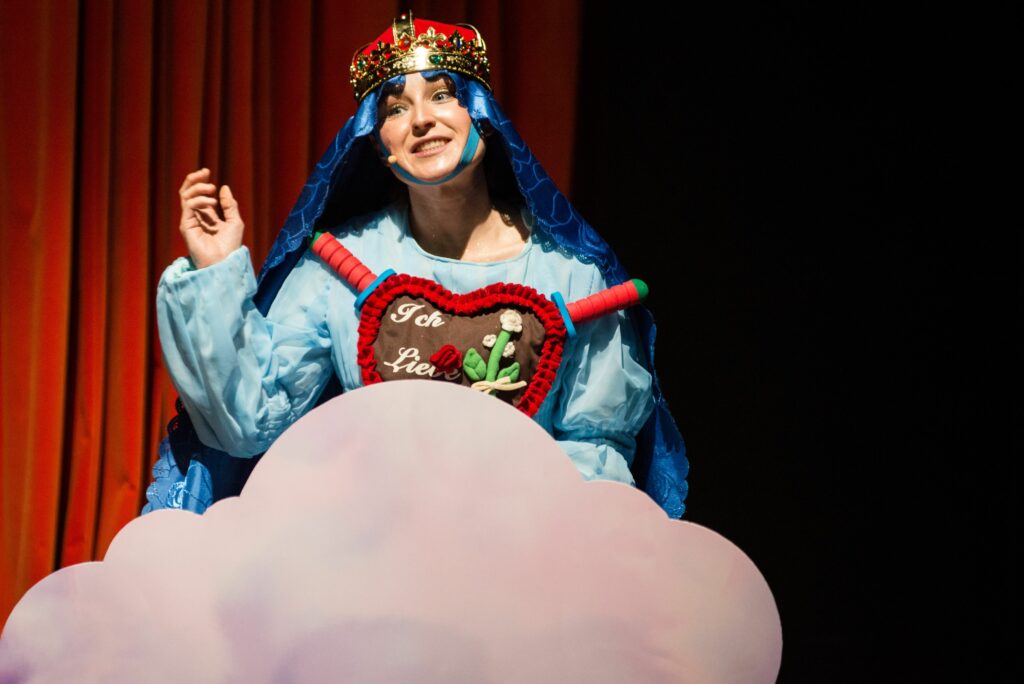
Natalia Kalita in Dawid jedzie do Izraela by Jędrzej Piaskowski and Hubert Sulima; directed by Jędrzej Piaskowski. Photo by Muzeum POLIN / Maciek Jaźwiecki.
During World War II, Halina (Sebastian Pawlak) and her husband (Rafał Maćkowiak) took in a Jewish boy and promised his parents to raise him as a Pole. Jan, or actually David (Jan Dravnel), finds out about his past out of the blue. One day Halina just informs him of his true identity and that he has to leave the country. His parents force David to wear a black Jewish coat and put on a false beard with side locks, while his father brings him a ‘long-ready bundle’ for the journey. In an instant, David seems to turn into a Jew from a pre-war shtetl. His parents yell frantically, showing him typical Jewish gestures (‘you go forward but lean back as if you wanted to go backwards’) and how to pray with hands stretched upwards. To help David learn more about his identity, Halina resorts to anti-Semitic stereotypes ‒ the Jew is a stranger, invariably carries chips on his shoulder, and above all, always suffers from some trauma ‒ and then explains to her son that he will certainly be better off in Israel where he will make new friends. Janek’s transformation into David is ostentatious, the absurdity and comedy of the situation mingles with horror ‒ from now on Janek’s fate will be determined by the imposed difference. A series of contradictory scenes follow. Now the parents are proud of their son, now they claim they did not know anything, as if they felt that David’s Jewish origin was their fault. Unexpectedly, Henryk’s mother descends on the family. In between taking bites of her cheesecake she says that she and her son have Jewish roots too, but one of the grandparents had changed his name. Besides, she’s won a trip to Israel, and plans to go there with David. Halina goes back and forth between euphoria and hatred, between satisfaction that her son will have a better life than their life in Poland and frustration when she has to pack his life into a few cardboard boxes. She comforts him and then drags him in front of the proscenium shouting out to the audience: ‘Is that what you wanted? A March like this?!’ She throws a tantrum and rips the boxes apart. When David finds out he is going to Israel, he twists his arms and legs, shouts and pushes against his mother sitting on the sofa, as if he wanted to sit on her lap. It turns out that David is disabled and needs constant care from his parents. The scenes are not bound by a cause-and-effect logic, it is impossible to say where and when the action takes place, because it is in continuous flux, the theatrical joke is mixed with earnestness. The actors segue from scene to scene seamlessly and with humour, getting out of character for short spells. (Pawlak and Maćkowiak explain to Dravnel that his Lithuanian passport and background can be a problem, and then ‒ as David’s parents ‒ assure him of their support in his predicament…). The actress Natalia Kalita, who is on stage at all times with the three men, plays the Virgin Mary, mother-in-law, shopkeeper and even Queen Aldona Gediminas. She keeps a low profile on the right side of the stage, clad in a blue dress with a big heart stitched on the front, with a navy blue veil and a crown on her head. She always speaks calmly and slowly with a fake smile plastered on her face.
The sense of sudden rejection and alienation from his parents is a much bigger problem for David than his new identity which he does not fully grasp. His mother keeps on shouting at him, blames him for the anti-Semitic attacks she faces (including threatening and abusive phone calls). When the boy calls her to come and read him a book, she becomes impatient and angrily tells him to go to sleep. His father comes instead, puts on a lamp shade with an illuminated transparent plastic sheet attached, and starts telling his son a fairy tale. The gentle act of dressing up and playing with his son, however, has a gruesome twist, as the father tells the story of a kike boy whom his community wants to be burned at the stake, but he is saved at the last moment by a large frog. The father sings a terrifying lullaby: ‘A pogrom’s coming in the dark / With an apron full of stars / With the twinkling stars so bright / Kikes are waking, looking out / Kikes sleep tight, ah ah ah / Kikes sleep tight, ah ah ah / Kikes sleep tight, ah ah ah.’ Other than that, the father’s interest is limited to preparing kosher meals for his son. From now on, David’s origin rears its head at every step, even in circumstances in which he previously felt safe. Seeking comfort in a confusing situation, David escapes into a fantasy world where he meets a character from a TV series, Aldona, wife of King Casimir the Great. The woman talks about her life with Casimir, who regularly cheats on her with Esther, a Jewish woman from Kraków. The story of the secret royal love affair breaks off unexpectedly. Dravnel concludes that the whole situation is kitschy and pointless, Kalita criticises the sets but takes comfort from the fact that at least she is making some money, chastises her colleague for complaining, because he will have bragging rights to having played a disabled person. Then Aldona’s story returns. She concludes it with a poem saying that you need to get out of situations which discomfort you and speaks of fighting for one’s dignity. Halina ‒ who has to find a way to cope with the March witch hunt too, to overcome shame and humiliation ‒ relates to that narrative.
Tired and resigned, Halina goes to a convenience store, Żabka (Froggie), where she is informed she is the shop’s millionth customer which entitles her a prize from the Virgin Mary. The prize is a miracle of no anti-Semitism in Poland. The woman speaks calmly, with great solemnity, the stage is flooded with light. The family is slightly confused, they feel lost in the new situation. The father asks if he is still a Pole. David is relieved to say that now he can just be himself. The absurdity and comedy of that scene is, in fact, saddening; Polish society can only be freed from the sin of hatred by the kitschy ‘Polish’ Virgin Mary, stripped of her ‘ethnic’ identity, in whom nobody believes.
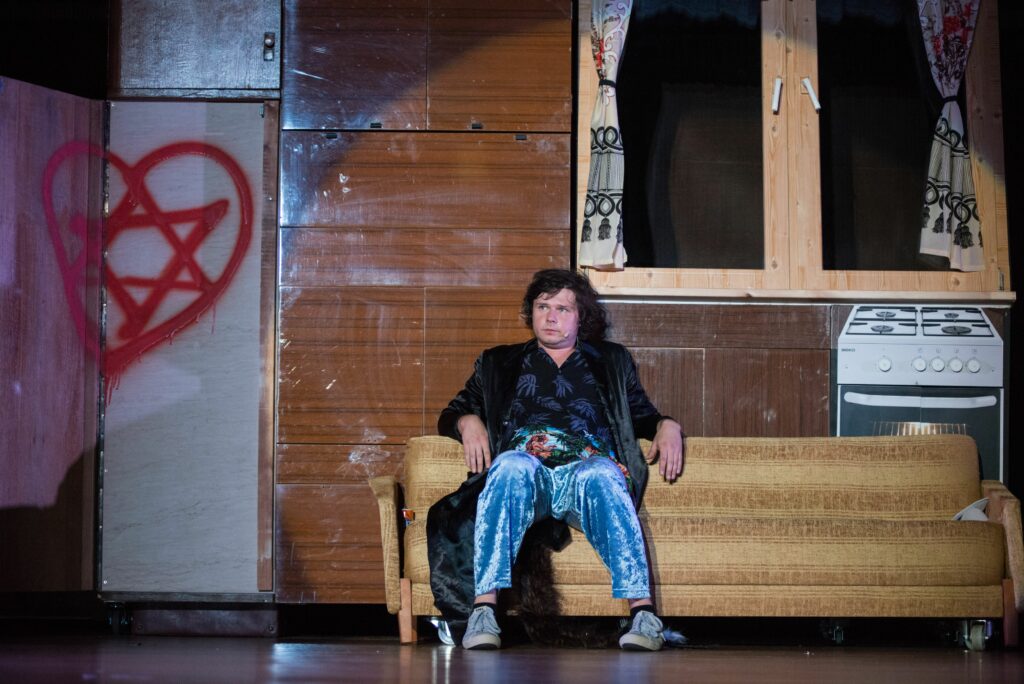
Jan Dravnel in Dawid jedzie do Izraela by Jędrzej Piaskowski and Hubert Sulima; directed by Jędrzej Piaskowski. Photo by Muzeum POLIN / Maciek Jaźwiecki.
In the final part of the play, the family and mother-in-law go for a spring walk. It is March, nature is coming back to life, everyone admires the first rays of sunshine. They are relaxed and smiling. The idyll comes to a sudden halt when David reminds everyone that March is a month of the infamous 1968 events. Halina gets hysterical, gasps, almost faints. She has no idea of what is happening to her. Her husband tries to help by diverting Halina’s attention from historical parallels. He suggests that March is also the month of Józef’s name day… Finally, they decide to forget the past instead of revisiting it. They leave the stage together, bickering about which ice cream flavour to choose at a confectionery nearby. Halina’s March hiccups are over, but it seems that Polish society hasn’t had them yet…
Piaskowski tells the story with a light and certain hand, unnoticeably mixing various orders and conventions. Despite their fraught subjects, his plays are extremely funny, which rubs on the actors who, however, are not tempted to test the limits of bravura. Sebastian Pawlak, who plays Halina, excels in this department ‒ he can be playful while at the same time distancing himself from his character, sporting an undulating blouse, short skirt and heels. He is joined in this by Rafał Maćkowiak, who plays his husband. Subtle, confused and somewhat dominated by Halina, he tries to be her rock in rough times. Jan Dravnel avoids literalness and realism too but incarnates the little boy with empathy.
David Goes to Israel is not just a play where the creators confront the contradictory narratives surrounding Polish‒Jewish relations. It can also be seen as the testimony or voice of a generation that did not live through the 1968 events and now try to confront their historical memory; an artifact documenting a knowledge about March 1968 generated in 2019. The Zachęta Gallery has purchased Paweł Sakowicz’s performance, Jumpcore. Perhaps the POLIN Museum could add David Goes to Israel to its collection and exploit it a bit longer than is usually the case, thus continuing the discussion on March 1968 outside the context of the round anniversary of the events.
TR Warszawa, POLIN Museum of the History of Polish Jews
David Goes to Israel
Theatre script by Jędrzej Piaskowski and Hubert Sulima; directed by Jędrzej Piaskowski; dramaturgy by Hubert Sulima; stage design by Kornelia Dzikowska; costumes by Hanka Podraza; music by Jan Tomza Osiecki; choreography by Mikołaj Karczewski; premiered on 8 September 2018.
This article was originally published in Polish by Didaskalia. Theater Journal 2019, no. 149. It was translated into English by Didaskalia for TheTheatreTimes.com and reposted with permission.
This post was written by the author in their personal capacity.The opinions expressed in this article are the author’s own and do not reflect the view of The Theatre Times, their staff or collaborators.
This post was written by Marta Bryś.
The views expressed here belong to the author and do not necessarily reflect our views and opinions.

